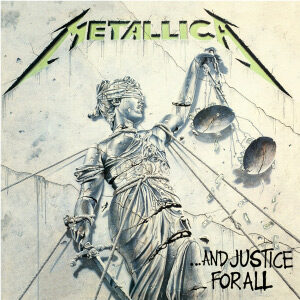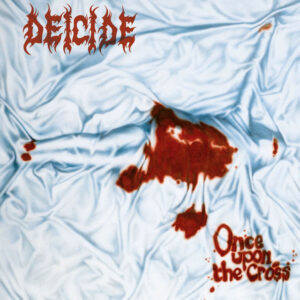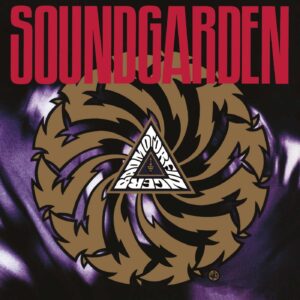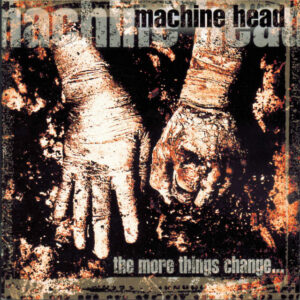 Mechanical, yet human, fury
Mechanical, yet human, fury
I understand that a Metallica review today might be one of the more redundant exercises in writing about music, but hear me out. If there was a Metallica album that was in need of more reviewing, this is it. Not part of the much lauded holy trinity of thrash that preceded it or the string of sharply polarising and much derided works that followed, …and Justice for All is neither famous (aside from ‘One’) nor infamous – it’s simply there for most listeners, an odd diversion by the band that led to nothing. Which is a shame, as it’s easily my favourite Metallica album. I firmly believe it to be one of the greatest metal albums ever conceived, and an incredibly unique one at that.
It’s probably the most controversial and legendary aspect of the album, and to my mind the most important: the production. It really is as dry and sterile as everyone says – there is no warmth to the sound at all. Everything sounds very thin and trebly, and while there are bass frequencies to the sound there is indeed no bass guitar to be heard. I know for a lot of listeners that this is a major turn-off (though I’ve never had a problem with the way the album sounded, this may be because it was one of my first metal albums and as such the sound didn’t strike me as especially odd, no stranger than the albums that came before it), however I can’t imagine this album without it, and I highly doubt the album would benefit from a more normal sound. It’s not an accessible or indeed objectively good production style at all; however it casts every single second of the songs in a new light, by stripping the instrumentation of any human touch they may have had. What would be a warm, reverby drum kit is now a stark, clicking yet thudding timekeeper that marches in the background, and the guitars turn into serrated, thin razors that grind away endlessly. And while it was terrible of the band to haze Newstead by turning him right down, I do believe the removal of the bass guitar only furthers the coldness of the sound – the album is better for it.
This harsher, colder backdrop fits perfectly with the vocal performance, which is another notable aspect of this album. Never before did James ever sound this angry, or bitter, or resentful. He easily delivers his harshest, heaviest and *best* vocal performance here, without question, and is given a rougher edge by the production. Paired with intelligent but still memorable and concise lyrics on environmental destruction, corruption in the justice system, wanton psychotic violence and the horrors of warfare, and you have the righteous anger of a man disillusioned of the world delivered over the most aggressive sounding riffs and drum beats Metallica would ever write. Slow burning, almost grooving tracks like ‘Harvester of Sorrow’ or ‘Eye of the Beholder’ become relentless crushers that flatten all in their path. Already supercharged barnstormers like ‘Dyers Eve’ or ‘Blackened’ become some of the most intense thrash ever written; the former in particular still floors me to this day with its rapid fire gun-like double bass and unbridled resentment.
It’s not as if the instrumentation is merely a backdrop, either. More often than not it takes centre stage, and even peering behind the vocals reveals incredible performances all around. As has been mentioned, some of the band’s most aggressive and destructive riffing comes through here (‘Dyers Eve’, ‘The Shortest Straw’), and even during the more mid-paced moments the riffs still shine as being highly memorable, with the band working some monolithic grooves into their songs (‘Harvester of Sorrow’ or the descending riff of ‘The Frayed Ends of Sanity’; a nice fit to the theme of the song) and lacing these slower moments with chugs, giving rise to a drudging heaviness not unlike doom metal. The same can be said of the drum performance; when Lars isn’t functioning solely as a timekeeper several of the patterns and fills on here are quite technical, and on the whole Lars pounds away on the kit relentlessly, particularly with that distinct pattern on the title track or the incessant double bass of ‘Dyers Eve’. The soloing is at its most technical too, it’s not a major point when they occupy relatively short slots in these much longer songs but they do serve to give a little variation to the album, a brief respite from the endless onslaught of riffing.
A complaint this album often receives is the sheer repetition of the material, and a general sense of the album being too long for its own good. To my ears however, this is part of the reason for the album’s potent atmosphere. The riffs repeat for relatively long stretches of time, as do the drums. In doing so, combined with the sound and atmosphere already present, they take on a very mechanical and almost… industrial feel to them. The likes of ‘Eye of the Beholder’ or ‘To Live is to Die’ really build on this with a principal chugging, groovy riff being repeated for most of the song. Instead of making the riffs or beats stale, the repetition adds to their power, by turning them into a principal reference point that guides each song to keep them on track. It keeps the songs direct and focused, even when they approach 10 minutes in length. It also adds to the coldness of the backdrop the lyrics are set against; there is no natural variation to be found, only unyielding repetition of guitars and drums grinding against one another.
The feel of this album is unlike one I’ve ever encountered. At times sorrowful and touching (the halfway point of ‘To Live is to Die’ or the first half of ‘One’), and at times driven purely by rage – many thrash albums can do both, but none make it quite as visceral as this. That in and of itself is quite an achievement, given what they’re working with; they’ve turned one of the most mechanical sounding albums into one that conveys human emotion better than so many others. They made a focused, energetic album with a handful of riffs when some bands don’t manage that with 246. This is without question one of the greatest metal albums, and one that has aged so gracefully as to be more effective now than it was 30 years ago – perhaps due to general resentment towards the world increasing since then, but also because nothing since has come close to achieving what it has, a fact that rings more and more true with each passing day. A forgotten experiment this may have been – but certainly not a fruitless one.
Rating: 100%
 Stop it
Stop it Much, much less than the sum of its parts
Much, much less than the sum of its parts ‘Fire as far as the eyes can see’
‘Fire as far as the eyes can see’ An interesting artefact
An interesting artefact Hits like a Phillips head into the brain
Hits like a Phillips head into the brain Bleh
Bleh Onward from Golgotha
Onward from Golgotha A ‘failed’ experiment
A ‘failed’ experiment Difficult to fathom
Difficult to fathom